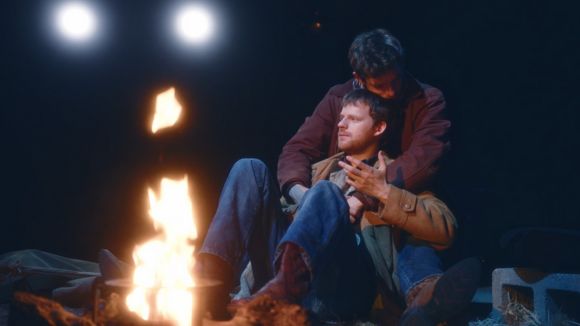Brokeback Mountain on stage
Brokeback Mountain: intimacy and its many forms
In honour of Brokeback Mountain having recently ended its West End run in London’s new theatre @ Soho Place, I thought this would be an opportune moment to write about this story. Brokeback Mountain is a story many are familiar with, mostly through the 2005 film starring Heath Ledger and Jake Gyllenhaal, and the West End production has given it new life through actors Lucas Hedges and Mike Faist in the roles of Ennis del Mar and Jack Twist, respectively.
Annie Proulx’s short story Brokeback Mountain is a deeply intimate portrait of two men in love, and that fact is clear on film and on stage alike. What interests me is how those different forms of the story operate in different ways to evoke that intimacy. How can a film be quite as intimate as live theatre? How can theatre speak directly to us in the way the narrator of a short story can?
I was lucky enough to watch Brokeback Mountain on stage with a friend, and when we shared our thoughts after the show, one thing we kept coming back to was the multitude of ways we felt the intimacy between Ennis and Jack on stage. Ennis and Jack’s relationship is not only a physical sexual awakening; there’s a deep connection that cannot be explained, or put into words. They talk (eventually) but they never say “I love you”, they have sex but they never say “I love you”, they hold each other but they never say “I love you”. But they don’t need to.
In her short story, Annie Proulx’s narration balances this deep intimacy between Jack and Ennis with a sense of the vastness of the world they live in - the remoteness of Brokeback Mountain, the physical distance between them when they part ways, the insurmountable barrier set down between them by a violently homophobic society. And so there is the intimacy between two people in love, and there are the massive obstacles in their way.
Ang Lee’s film achieves this by staying quiet. There’s not much dialogue throughout the film, but we don’t miss any of the meaning in the lingering glances, the stillness, the silence. Unlike the short story, Ledger and Gyllenhaal gave Ennis and Jack real bodies occupying a space together. In other words, the physical chemistry that is so important to Jack and Ennis’ relationship is made clear to us on screen.
So when you set this story to the stage, what happens is something even more profound. Whilst Proulx’s short story and Lee’s film took us away from Brokeback Mountain and gave us a different visual stimulus, @ Soho Place’s intimate auditorium did not. Whilst Proulx and Lee used those different settings to contrast with the closeness between Ennis and Jack, the limitations of the theatre space and sets didn’t let us stray too far. The world of Jack and Ennis, as far as this production is concerned, is actually quite small, but just big enough for the two of them together.
And so across these three versions of Brokeback Mountain - short story, film, and stage play - it seems there’s been a shift in how the intimacy between the principal characters is played out. Proulx’s narrator gave the reader a window into the mind and heart of Ennis; Lee’s film let us see the chemistry at work between Ennis and Jack; Nica Burns’ West End production let the audience be in their world, if only for a few hours.
This is not a competition between what version of Brokeback Mountain is superior. What’s important is that at the end of it all, what remains at the core of the story is this intimacy between two people. It doesn’t matter how we see it, imagine it, or hear it - there is no doubt that we feel it.



Comments
Post a Comment